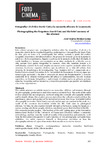Fotografiar el olvido: David Catá y la memoria efímera de la ausencia

Use este enlace para citar
http://hdl.handle.net/2183/32233
Excepto si se señala otra cosa, la licencia del ítem se describe como Atribución-NoComercial-SinDerivadas 3.0 España
Colecciones
- Investigación (FEDU) [938]
Metadatos
Mostrar el registro completo del ítemTítulo
Fotografiar el olvido: David Catá y la memoria efímera de la ausenciaTítulo(s) alternativo(s)
Photographing the forgotten: David Catá and the brief memory of the absenceAutor(es)
Fecha
2022Cita bibliográfica
Mesías Lema, J. M. (2022). Fotografiar el olvido: David Catá y la memoria efímera de la ausencia . Fotocinema. Revista Científica De Cine Y Fotografía, (25), 355-380.
Resumen
[Resumen] Este artículo propone una investigación artística sobre los recuerdos, el olvido y la memoria a través de la creación fotográfica, performativa y videográfica de David Catá. Su obra gira en torno a la autobiografía del artista, contada a partir del archivo fotográfico doméstico y del álbum familiar. Su proceso de creación parte de la memoria colectiva y de las experiencias, lugares y poéticas de la memoria individual. El duelo, la herida familiar y el trauma son constantes en su obra, producto de la fricción con su vida, porque Catá quiere fotografiar la ausencia. Para ello, también recurre a la performance, a través de la cual, emplea sus manos como soporte, cosiendo sobre ellas personas, familiares, espacios afectivos que interfieren en la vida del artista. Este proyecto de transferencia de investigación, “Las fronteras del yo”, enmarcado en el Festival Internacional Cervantino de la Universidad de Guanajuato (México), sigue una metodología curatorial, y ha sido el resultado de meses de documentación y creación comisarial de la primera restrospectiva del artista en Latinoamérica. En este montaje expositivo, en formato fotográfico y audiovisual, el artista narra en primera persona cómo las fotografías activan memorias y recuerdos personales que pueden ser similares a los de los espectadores. [Abstract] This article presents an artistic research on memories, oblivion and memory through the photographic, performative and video creation of David Catá. The work of this artist evolves around his autobiography, narrated using the domestic photographic archive and his family album. His creation process starts from the collective mind and from the experiences, places and poetics of his individual memory that helps him build further photographic memories. Grief, family wounds and trauma are constant in his work, as a result of the constant intersections within his life. Catá aims to photograph oblivion. For this, he also express himself through performance, using his hands as a canvas, sewing onto them: people, relatives, emotional spaces that interfere in his life. This research transfer project, “The borders of the self”, taking place at the Cervantino International Festival of the University of Guanajuato (Mexico), follows a curatorial methodology, and has been the result of months of documentation and curatorial work from the first artist retrospective in Latin America. In this photography and audiovisual exhibition, the artist expresses himself in first-person narration on how the photographs activate all types of memories that can also relate to the viewer.
Palabras clave
Fotografía contemporánea
Memoria
Recuerdos familiares
Autobiografía visual
Olvido
Álbum familiar
Contemporary Photography
Memory
Family Memories
Visual Autobiography
Family Album
Memoria
Recuerdos familiares
Autobiografía visual
Olvido
Álbum familiar
Contemporary Photography
Memory
Family Memories
Visual Autobiography
Family Album
Versión del editor
Derechos
Atribución-NoComercial-SinDerivadas 3.0 España
ISSN
2172-0150






